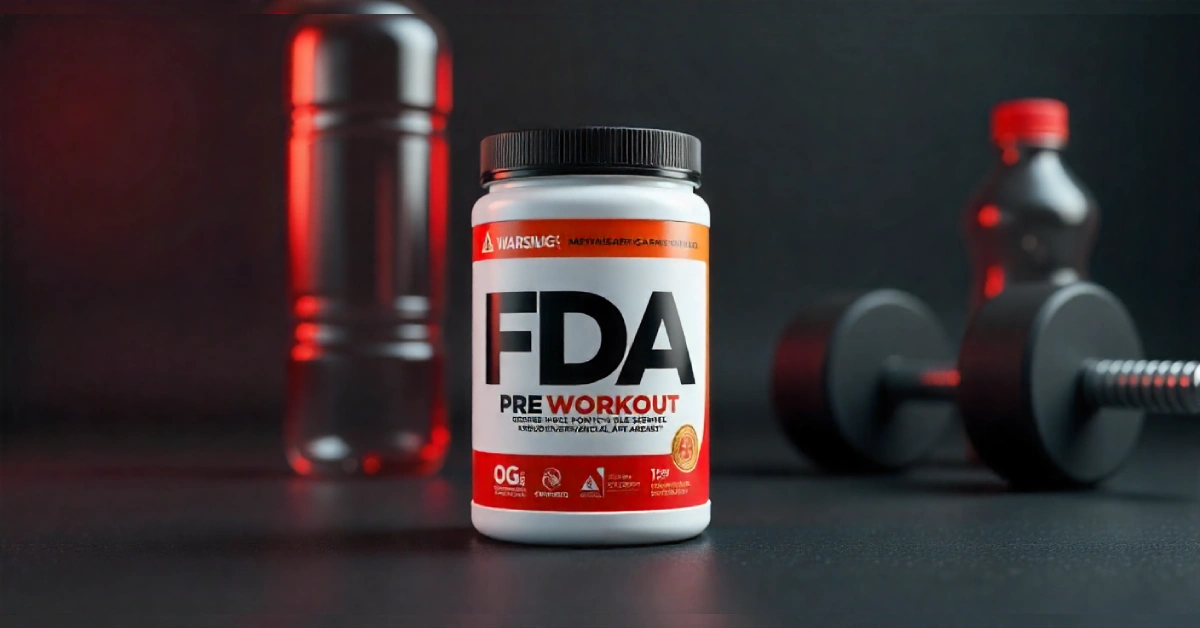You’ve probably heard whispers about DMAA pre-workout supplements in gym circles. Maybe your training partner mentioned it, or you stumbled across it while researching powerful sports supplements online.
Here’s the thing: DMAA (1,3-dimethylamylamine) isn’t your typical supplement ingredient and has been scrutinized by the US Food and Drug Administration for its adverse effects, including potential myocardial infarction associated with dietary supplements. This amphetamine derivative once dominated the pre-workout scene before regulatory concerns regarding the ingestion of DMAA changed everything.
Understanding what DMAA actually is—and why it matters—can help you make smarter decisions about your supplement stack. Let’s dive into the real story behind this controversial ingredient and its marketing of DMAA in the supplement industry.
What Is DMAA and Why Was It Popular?
DMAA, also known as methylhexanamine, gained massive popularity in pre-workout formulas during the early 2010s, leading to increased scrutiny and drug tests by the World Anti-Doping Agency. This synthetic stimulant delivered intense energy and focus that many users found unmatched.
The compound works by stimulating your central nervous system, similar to amphetamines. Users reported incredible workout intensity, laser-sharp focus, and energy that lasted for hours, particularly with preworkout supplements containing clinically-dosed ingredients.
Popular products like Jack3d and OxyElite Pro contained synthetic DMAA as their primary stimulant. These supplements developed cult followings among serious lifters and athletes seeking maximum performance enhancement, but it’s important to consider the potential adverse effects, including liver injury.
However, DMAA’s powerful effects came with significant risks. The FDA became increasingly concerned about cardiovascular side effects and safety issues reported by users of products containing DMAA.
By 2012, regulatory pressure mounted as the US Food and Drug Administration linked DMAA to serious adverse events, including myocardial infarction associated with dietary supplements. The golden age of DMAA pre workout supplements was coming to an end due to increasing scrutiny and drug tests.
The FDA Ban and Safety Concerns
The FDA officially declared DMAA unsafe for human consumption in dietary supplements, emphasizing the risks associated with ingestion. This decision followed reports of heart attacks, strokes, and other serious cardiovascular events.
DMAA narrows blood vessels and raises blood pressure significantly, raising concerns about its safety as indicated by the Food and Drug Administration, especially for those consuming DMAA. These effects can be dangerous, especially when combined with other stimulants like caffeine.
The agency issued warning letters to supplement companies, demanding they remove DMAA from their products immediately due to concerns about acute myocardial infarction associated with its use. Companies that refused faced legal action and product seizures associated with dietary supplements containing DMAA.
USPLabs, makers of Jack3d, ultimately destroyed over $8 million worth of DMAA-containing products. Hi-Tech Pharmaceuticals faced federal court proceedings that resulted in product condemnation and forfeiture of supplements that contain products with DMAA.
Today, any supplement containing DMAA is considered adulterated and illegal in the United States, particularly after numerous case reports of adverse effects. The Supreme Court upheld these decisions in 2020, which included rulings on the legality of certain weight loss supplements.
How to Identify DMAA in Supplements
DMAA appears under many different names on supplement labels, making identification tricky for consumers. Always check ingredient lists carefully before purchasing any pre-workout product, especially those that might contain a dietary supplement containing synthetic DMAA.
Common names include 1,3-DMAA, dimethylamylamine, methylhexanamine, and geranamine, all associated with the controversial marketing of DMAA. Some products list “geranium extract” or “Pelargonium graveolens extract” to disguise DMAA content, which raises concerns about the product label accuracy and the biochemical and anthropometric effects on users.
Manufacturers sometimes use misleading marketing terms like “natural geranium” to suggest plant origins in products marketed as dietary supplements. However, the FDA states that no reliable evidence exists that DMAA occurs naturally in plants.
If you’re unsure about an ingredient, research it thoroughly before consuming. Reputable supplement companies provide transparent labeling and third-party testing information.
Remember that international products may still contain DMAA. Always verify ingredients when purchasing supplements from overseas sources or unfamiliar brands.
Legal Alternatives to DMAA Pre Workout
Modern pre-workout formulas offer powerful alternatives without DMAA’s legal and safety issues, making them a better choice for healthy men and women. These ingredients provide excellent energy and focus enhancement through different mechanisms.
Caffeine remains the gold standard stimulant, providing reliable energy without serious cardiovascular risks. Most effective pre-workouts contain 150-300mg of caffeine per serving, often alongside other ingredients in products marketed as dietary supplements, but be cautious of those containing synthetic DMAA.
L-citrulline improves blood flow and muscle pumps while supporting endurance during intense training sessions. Beta-alanine reduces muscle fatigue and extends workout capacity, contributing positively to sports performance.
Tyrosine enhances mental focus and cognitive function under stress, serving as a safer alternative to the risks associated with taking DMAA. Alpha-GPC supports the mind-muscle connection and power output during heavy lifting, making it a popular ingredient in preworkout supplements.
These ingredients work synergistically to deliver impressive results. Modern formulations often surpass old DMAA products in both effectiveness and safety, particularly in the realm of sports performance.
What to Look for in Safe Pre-Workouts
Quality pre-workout supplements should contain clinically-dosed ingredients with transparent labeling to ensure safety and effectiveness in relation to heart rate and blood pressure. Avoid proprietary blends that hide individual ingredient amounts behind vague descriptions, particularly when they may include DMAA or other potentially harmful substances.
Third-party testing ensures products contain what labels claim without harmful contaminants. Look for certifications from NSF International or Informed Sport programs.
Reputable brands provide detailed ingredient information, including dosages and scientific backing, especially for products associated with dietary supplements containing DMAA and the risks of death associated with its use. They also offer customer service support and money-back guarantees, which is essential for consumers wary of products marketed as dietary supplements associated with adverse effects.
Start with lower doses to assess your tolerance before increasing serving sizes, especially in adults ingesting dietary supplements containing stimulants. Some people are more sensitive to stimulants than others, which can lead to potentially harmful reactions when taking DMAA.
Consider your training schedule when timing pre-workout consumption. Most products work best when taken 20-30 minutes before exercising, aligning with the timing recommended for optimal sports performance.
The Current State of Pre-Workout Innovation
Today’s supplement industry has moved far beyond DMAA dependency, focusing instead on research on DMAA alternatives for better sports performance. Innovative ingredients and delivery methods provide superior results without regulatory concerns.
Nootropic compounds like Lion’s Mane and Rhodiola Rosea enhance cognitive function naturally, providing a safer alternative to potentially harmful stimulants like DMAA. These adaptogens support mental clarity without harsh stimulant crashes, making them a safer alternative to potentially harmful substances like DMAA.
Advanced pump ingredients like nitrosigine and VasoDrive-AP deliver incredible muscle fullness, often marketed alongside creatine monohydrate for enhanced performance. These compounds work through different pathways than traditional nitric oxide boosters, offering unique benefits for sports performance.
Time-release caffeine systems provide sustained energy without sudden peaks and valleys. This technology prevents the jittery feeling common with instant-release stimulants, which can be exacerbated in products containing high dosages of stimulants like DMAA.
Electrolyte complexes support hydration and prevent cramping during extended training sessions, especially for healthy men engaging in intense workouts. Proper mineral balance becomes crucial for maximum performance and is often highlighted on product labels.
Making Smart Supplement Decisions
Research ingredients thoroughly before adding new supplements to your routine. Understanding how compounds work helps you make informed decisions about potential risks and benefits.
Consult healthcare professionals if you have pre-existing conditions or take medications, particularly those affecting heart rate and blood pressure, as they may interact with supplements that contain DMAA. Some ingredients may interact with prescription drugs or worsen certain health issues, making it crucial to consult a healthcare professional before using supplements that contain DMAA.
Start with basic, proven ingredients before experimenting with exotic compounds, particularly those derived from geranium plants, which may have biochemical and anthropometric effects. Caffeine, creatine, and protein powder provide excellent results for most people.
Quality matters more than quantity when building an effective supplement stack, especially when considering the anthropometric effects of a weight loss regimen. Focus on reputable brands with transparent practices rather than chasing the latest trends in products marketed as dietary supplements that may contain synthetic DMAA.
Remember that supplements support training and nutrition—they can’t replace consistent effort, especially when considering the safety of DMAA. The best pre-workout is useless without proper programming and recovery, as well as awareness of the effects of DMAA.
Conclusion
The era of DMAA pre workout supplements taught us valuable lessons about balancing performance with safety, especially regarding the use of DMAA and its impact on heart rate and blood pressure. While these products delivered incredible results, the risks ultimately outweighed the benefits.
Today’s alternatives provide excellent energy, focus, and pump effects without legal complications. Modern formulations often exceed old DMAA products in both effectiveness and user experience.
Your best bet is choosing well-researched, transparently labeled products from reputable companies that do not include a product containing DMAA or high dosages of stimulants. This approach ensures you get real results while protecting your health and staying within legal boundaries.
What matters most is finding a pre-workout that supports your goals consistently and safely. The supplement landscape continues evolving, but smart choices regarding the effects of DMAA continue to remain timeless for healthy men and women, especially in light of recent research on DMAA.

